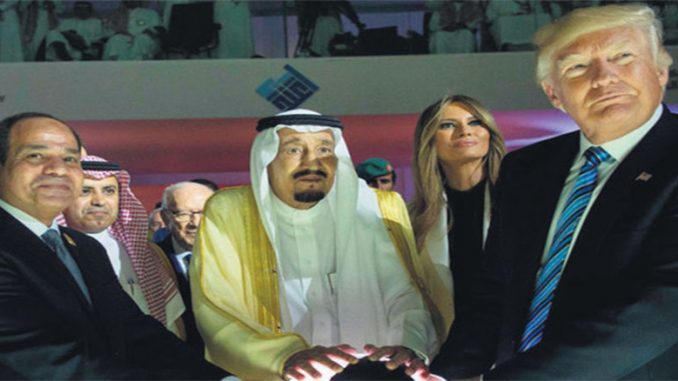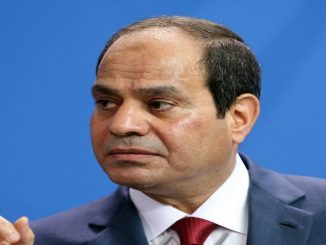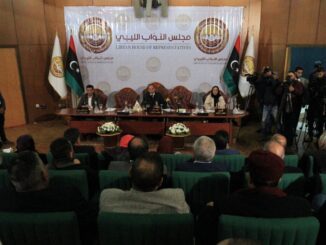
US President Donald Trump was only days into office in January 2017 when he first began considering a move with the potential to ignite a firestorm in the Middle East: designating the Muslim Brotherhood, a sprawling group that reaches from Morocco to Malaysia, a terrorist organization.
Mr. Trump’s hard-line national security adviser at the time, Michael T. Flynn, started a review of whether the United States should impose sweeping sanctions on millions of people across the Middle East. But only weeks later, after Mr. Flynn was fired, the proposal was quashed by Defense Secretary Jim Mattis, Secretary of State Rex W. Tillerson and Lt. Gen. H.R. McMaster, the next national security adviser.
Government lawyers had warned that the Muslim Brotherhood did not meet the legal criteria to be designated a terrorist organization. And in a volatile region where American troops were already battling Islamist extremists, the three men believed, taking on the Brotherhood was one fight too many.
Those men are now gone. So, when President Abdel Fattah el-Sisi of Egypt, a strongman who views the Muslim Brotherhood as a source of political opposition, visited the White House on April 9 to renew his longstanding calls for Mr. Trump to target his foes, he found himself pushing on an open door.
The Trump administration has resurrected the proposal to brand the Muslim Brotherhood a terrorist organization, prompting a fierce debate between the government’s political appointees and its career experts.
The designation would impose wide-ranging American economic and travel sanctions on companies and individuals who interact with the loose-knit Islamist movement that was founded in Egypt and is recognized as a legitimate political entity in many Muslim-majority governments.
It is the president’s latest major foreign policy decision that appears to have been heavily influenced by autocratic leaders without first being fully vetted by career American government officials.
At the same time that he was meeting with Egypt’s president, a senior administration official said, Mr. Trump and his son-in-law and adviser, Jared Kushner, were being prodded by leaders in Saudi Arabia and the United Arab Emirates who also revile the Muslim Brotherhood as a political opponent.
Mr. Trump spoke by telephone with Crown Prince Mohammed bin Salman of Saudi Arabia on April 9, the same day he met with Mr. el-Sisi.
Three days earlier, Mr. Trump had spoken with Crown Prince Mohammed bin Zayed of Abu Dhabi, the de facto leader of the United Arab Emirates; they talked again on April 18.
After that series of conversations, the White House also announced another reversal of American foreign policy: In a statement on April 19, Mr. Trump publicly endorsed Khalifa Hifter, an aspiring strongman in Libya, in his battle to depose the United Nations-backed government in Tripoli.
Egypt, Saudi Arabia and the United Arab Emirates all support Mr. Hifter as someone they believe will stabilize Libya, in part by keeping Islamist political parties from gaining power.
In Washington, the renewed campaign against the Muslim Brotherhood is far from assured.
A half-dozen current and former American officials and foreign diplomats familiar with the push discussed it on the condition of anonymity, several of whom said it faced legal and policy hurdles and could take weeks to resolve.
Secretary of State Mike Pompeo and John R. Bolton, the current national security adviser, were already on board with the proposed terrorist designation for the Brotherhood before Mr. el-Sisi’s visit to the White House, the officials said.
Victoria Coates, the senior director of Middle East policy on the National Security Council whose team is leading an interagency process to explore the policy shift, also supports the designation. She is a historian of European art who was hired at the White House after serving as a foreign policy adviser to Senator Ted Cruz, a Texas Republican with hard-line views on Middle East issues.
It is not clear where the acting defense secretary, Patrick M. Shanahan, stands on the Brotherhood. On Friday, he told reporters that he planned to discuss the issue with Mr. Pompeo before he expresses his views.
But, Mr. Shanahan said, concerns about American troops in states where the Muslim Brotherhood is viewed favorably are “important points.” The Pentagon has relied heavily on partnerships with Qatar and Turkey to fight the Islamic State or take on other military priorities in the region; both governments are the region’s strongest supporters of the Muslim Brotherhood.
Opposing the terrorist designation are United States counterterrorism, intelligence and defense officials, who worry it would divert resources from demonstrated terrorist threats, including the Islamic State and Al Qaeda, and roil American relations in the Middle East.
Administration lawyers have argued strongly that federal courts would overturn the designation and that the criteria for designating a terrorist organization are not a good fit for the Muslim Brotherhood, given that its members call for a society in accordance with Islamic law and generally do not advocate for violence.
Beyond Turkey and Qatar, the Brotherhood or offshoots are also a recognized political party or represented in governments in Morocco, Mauritania, Tunisia, Jordan, Bahrain and Kuwait.
Branding it a terrorist organization would not only jeopardize diplomatic or military relations with any of those nations, but also “politicize the designation process, which would undercut the strength of actual designations against terrorist groups,” said Andrew Miller, a former State Department official now at the Project on Middle East Democracy, a research group in Washington.
But some former Muslim Brotherhood members and offshoots — most notably Hamas, the Palestinian group whose stated goal is the destruction of Israel — have carried out attacks. The United States designated Hamas a terrorist organization in 1997.
And some advisers to Mr. Trump have for years viewed the Brotherhood as a radical faction that is secretly infiltrating the United States to promote extremist Islamic law. They see the proposed terrorist designation as an opportunity to finally take action against the movement.
In its frenetic first weeks, the Trump administration had weighed whether to issue the terrorist designation against both the Muslim Brotherhood and the Islamic Revolutionary Guards Corps, an arm of Iran’s military. But the proposals lost steam after career government officials objected, and against a fierce public backlash to Mr. Trump’s travel ban on visitors from several predominantly Muslim countries and other brazen early policies.
One former American official said the State Department has found no new evidence over the last two years that would make the Muslim Brotherhood a stronger candidate for the designation. Career diplomats and longtime foreign policy officials within the State Department do not favor making the designation, the official said.
Officials in the Obama administration had also looked at the potential for designating the Muslim Brotherhood, but found no basis for it.
The State Department controls the list of designated terrorist organizations and, as a matter of policy, Mr. Pompeo can override government lawyers and the recommendations of other agencies. The State Department declined to comment on the continuing review of the proposed Muslim Brotherhood designation.
On April 8, the day before Mr. el-Sisi visited the White House, Mr. Pompeo abruptly pushed through the terrorist designation and sanctions against the Revolutionary Guards in Iran.
A senior Trump administration official said the designation for the Revolutionary Guards had fueled the White House effort to brand the Muslim Brotherhood a terrorist organization. But, the official acknowledged, the move against the Brotherhood was an expansion of how administrations have traditionally used the terrorist designation process.
The official described the internal debate as “an extremely unglamorous process,” but insisted it was a high priority for Mr. Trump that ultimately would be accomplished.
Administration officials are also considering whether a narrower designation could survive a legal challenge.
One option would be to impose the terrorist designation against only the main Muslim Brotherhood group in Egypt, since that is the one of greatest concern to Mr. el-Sisi.
But even that would be problematic, officials argued, since there have been splits in the group and defining it is not easy. And unlike the Islamic State or Al Qaeda, there is no evidence that the Egyptian group has called for, or directed, terrorist attacks against American interests.
Under another option, Mr. Trump would issue an executive order against the Muslim Brotherhood using his presidential emergency powers. It would not declare a new emergency — like the one Mr. Trump is trying to use to spend more on building barriers along the border with Mexico than Congress has authorized — but the order would be attached to an existing terrorism-related emergency.
That way, one official said, the president could declare the Muslim Brotherhood a terrorist organization without going through the State Department.
A group of Republican politicians in Washington has for years demanded that the United States government designate the Brotherhood a foreign terrorist organization.
In 2017, Mr. Cruz pushed legislation to order the State Department to examine whether both the Islamic Revolutionary Guards Corps and the Muslim Brotherhood should receive the designation.
In late 2015, Mr. Pompeo, then a congressman from Kansas, joined other Republican lawmakers on a measure to put the Muslim Brotherhood on the list of foreign terrorist groups. Critics have seized on that to accuse Mr. Pompeo of anti-Islamic views, which he has denied.
Hussein Ibish, a senior fellow at the Arab Gulf States Institute in Washington, said some Muslim Brotherhood groups in the Middle East no longer cling to the movement’s dogmatic and transnational roots. He said designating the group a terrorist organization “would almost in a sense penalize them” for the reforms.
“It’s very odd. It’s an anachronistic idea,” Mr. Ibish said. “It doesn’t seem to recognize the big changes that have gone on.”
*The analysis was published by the New York Times on 6 May 2019.



